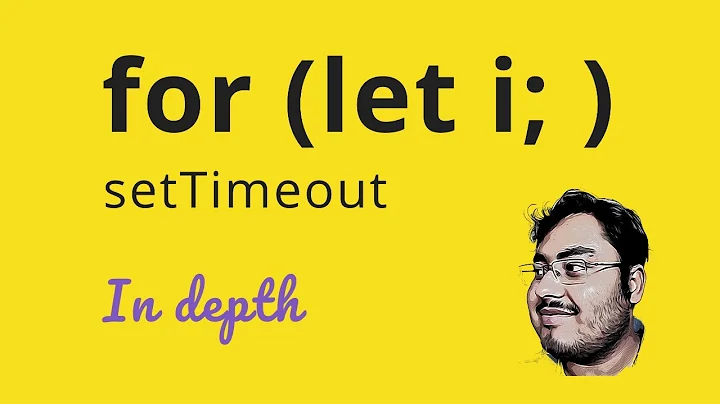How to implement a "function timeout" in Javascript - not just the 'setTimeout'
Solution 1
I'm not entirely clear what you're asking, but I think that Javascript does not work the way you want so it cannot be done. For example, it cannot be done that a regular function call lasts either until the operation completes or a certain amount of time whichever comes first. That can be implemented outside of javascript and exposed through javascript (as is done with synchronous ajax calls), but can't be done in pure javascript with regular functions.
Unlike other languages, Javascript is single threaded so that while a function is executing a timer will never execute (except for web workers, but they are very, very limited in what they can do). The timer can only execute when the function finishes executing. Thus, you can't even share a progress variable between a synchronous function and a timer so there's no way for a timer to "check on" the progress of a function.
If your code was completely stand-alone (didn't access any of your global variables, didn't call your other functions and didn't access the DOM in anyway), then you could run it in a web-worker (available in newer browsers only) and use a timer in the main thread. When the web-worker code completes, it sends a message to the main thread with it's results. When the main thread receives that message, it stops the timer. If the timer fires before receiving the results, it can kill the web-worker. But, your code would have to live with the restrictions of web-workers.
Soemthing can also be done with asynchronous operations (because they work better with Javascript's single-threaded-ness) like this:
- Start an asynchronous operation like an ajax call or the loading of an image.
- Start a timer using
setTimeout()for your timeout time. - If the timer fires before your asynchronous operation completes, then stop the asynchronous operation (using the APIs to cancel it).
- If the asynchronous operation completes before the timer fires, then cancel the timer with
clearTimeout()and proceed.
For example, here's how to put a timeout on the loading of an image:
function loadImage(url, maxTime, data, fnSuccess, fnFail) {
var img = new Image();
var timer = setTimeout(function() {
timer = null;
fnFail(data, url);
}, maxTime);
img.onLoad = function() {
if (timer) {
clearTimeout(timer);
fnSuccess(data, img);
}
}
img.onAbort = img.onError = function() {
clearTimeout(timer);
fnFail(data, url);
}
img.src = url;
}
Solution 2
You could execute the code in a web worker. Then you are still able to handle timeout events while the code is running. As soon as the web worker finishes its job you can cancel the timeout. And as soon as the timeout happens you can terminate the web worker.
execWithTimeout(function() {
if (Math.random() < 0.5) {
for(;;) {}
} else {
return 12;
}
}, 3000, function(err, result) {
if (err) {
console.log('Error: ' + err.message);
} else {
console.log('Result: ' + result);
}
});
function execWithTimeout(code, timeout, callback) {
var worker = new Worker('data:text/javascript;base64,' + btoa('self.postMessage((' + String(code) + '\n)());'));
var id = setTimeout(function() {
worker.terminate();
callback(new Error('Timeout'));
}, timeout);
worker.addEventListener('error', function(e) {
clearTimeout(id);
callback(e);
});
worker.addEventListener('message', function(e) {
clearTimeout(id);
callback(null, e.data);
});
}
Solution 3
I realize this is an old question/thread but perhaps this will be helpful to others.
Here's a generic callWithTimeout that you can await:
export function callWithTimeout(func, timeout) {
return new Promise((resolve, reject) => {
const timer = setTimeout(() => reject(new Error("timeout")), timeout)
func().then(
response => resolve(response),
err => reject(new Error(err))
).finally(() => clearTimeout(timer))
})
}
Tests/examples:
export function sleep(ms) {
return new Promise(resolve => setTimeout(resolve, ms))
}
const func1 = async () => {
// test: func completes in time
await sleep(100)
}
const func2 = async () => {
// test: func does not complete in time
await sleep(300)
}
const func3 = async () => {
// test: func throws exception before timeout
await sleep(100)
throw new Error("exception in func")
}
const func4 = async () => {
// test: func would have thrown exception but timeout occurred first
await sleep(300)
throw new Error("exception in func")
}
Call with:
try {
await callWithTimeout(func, 200)
console.log("finished in time")
}
catch (err) {
console.log(err.message) // can be "timeout" or exception thrown by `func`
}
Solution 4
You can achieve this only using some hardcore tricks. Like for example if you know what kind of variable your function returns (note that EVERY js function returns something, default is undefined) you can try something like this: define variable
var x = null;
and run test in seperate "thread":
function test(){
if (x || x == undefined)
console.log("Cool, my function finished the job!");
else
console.log("Ehh, still far from finishing!");
}
setTimeout(test, 10000);
and finally run function:
x = myFunction(myArguments);
This only works if you know that your function either does not return any value (i.e. the returned value is undefined) or the value it returns is always "not false", i.e. is not converted to false statement (like 0, null, etc).
Related videos on Youtube
sransara
[_]3 [^_^] d[o_0]b ~(__^> presenting to you with Sri Lankan awesomeness !
Updated on June 04, 2022Comments
-
sransara about 2 years
How to implement a timeout in Javascript, not the
window.timeoutbut something likesession timeoutorsocket timeout- basically - a "function timeout"A specified period of time that will be allowed to elapse in a system before a specified event is to take place, unless another specified event occurs first; in either case, the period is terminated when either event takes place.
Specifically, I want a javascript
observing timerthat will observe the execution time of a function and if reached or going more than a specified time then theobserving timerwill stop/notify the executing function.Any help is greatly appreciated! Thanks a lot.
-
Esailija over 12 yearsIt cannot be done, the function will not return control to anything until it is finished.
-
-
user276641 over 12 years
setTimeoutonly guarantees a minimum delay, ifexecuting functionis still running when the timeout expires, theobserving functionwill only get called onceexecuting functionis complete. You'll need to implement a JS version ofDoEventsto make this solution work. -
 jfriend00 over 12 yearsA timer will never get called while an executing function is running because javascript is single-threaded. The timer can ONLY get triggered after the function finishes executing. Therefore, I don't think this can work. If you think otherwise, please create a jsFiddle that shows this.
jfriend00 over 12 yearsA timer will never get called while an executing function is running because javascript is single-threaded. The timer can ONLY get triggered after the function finishes executing. Therefore, I don't think this can work. If you think otherwise, please create a jsFiddle that shows this. -
 jfriend00 over 12 yearsUnlike other languages, Javascript does not have threads that can freely share variables with other executing functions. It has web workers, but they can only communicate with the main thread via messaging, not by sharing variables.
jfriend00 over 12 yearsUnlike other languages, Javascript does not have threads that can freely share variables with other executing functions. It has web workers, but they can only communicate with the main thread via messaging, not by sharing variables. -
Rogel Garcia over 12 yearsYou're right. Thinking about it, if HTML5 is an option the use of a worker can be a possible solution. What do you think?
-
 jfriend00 over 12 yearsIf the function could live within the constraints of a web-worker (no shared variables or code with the main page, no DOM access, newer browsers only, etc...), then it might be possible with web-workers (as mentioned in both my answer and in Robert's answer).
jfriend00 over 12 yearsIf the function could live within the constraints of a web-worker (no shared variables or code with the main page, no DOM access, newer browsers only, etc...), then it might be possible with web-workers (as mentioned in both my answer and in Robert's answer). -
John B. Lambe over 3 yearsThis doesn't stop
myFunctionafter the timeout. The reason for wanting to stop it could be its performance impact, for example (and maybe it has a possibility of an infinite loop).








